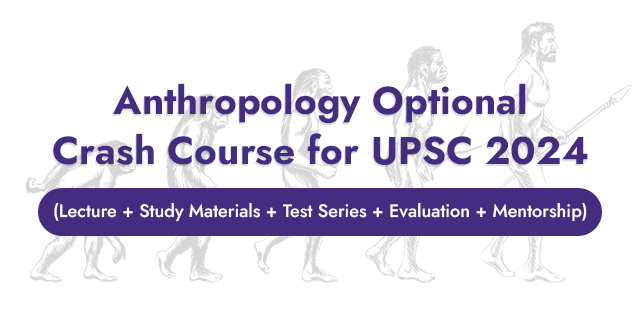Anthropology has always been a preferred optional subject in UPSC Civil Services Examination. With no special knowledge or specific academic background required for the preparation of Anthropology as an optional subject, students have been obtaining high scores in the UPSC Main examination.
Best Featrues of the course:
- Batch Start Date: 26th October, 2023
- Duration of the course is 2 Months.
- Complete and comprehensive coverage of entire syllabus.
- Updated study material along with recent case studies.
- Innovative methodology and interlinking of Paper I and II.
- Learn the art of writing wonderful answers thorough daily assignments.
- Special emphasis on paper II and Tribal India (Which is rarely taught elsewhere)
- Discussion on Previous Year Questions as well as expected Questions in details
- Test Series (4 Sectional Test + 4 Full Length Test)
- Personal One to One Mentorship
About the faculty:
- Faculty Name: Samrat Sir
- 3 Mains + 1 Interview
- MA Anthropology (NET)
- Mentoring USPC aspirants from last 5 years
Why Choose Anthropology as an Optiona for IAS Exam?
Choosing anthropology as an optional subject for the UPSC (Union Public Service Commission) Civil Services Exam in India has its own advantages and disadvantages. The choice of optional subject is a crucial decision that should be made based on your interests, strengths, and overall exam strategy. Here are some reasons why you might consider anthropology as your optional subject:
-
Interest and Background: If you have a genuine interest in anthropology, or if you have a background in anthropology (such as an undergraduate degree), it can be a good choice. Studying something you are genuinely interested in can make the preparation process more enjoyable and rewarding.
-
Scoring Potential: Anthropology has a reputation for being a scoring optional subject. It is considered relatively less challenging compared to some other options, and it can be a good choice if you are looking to maximize your score in the optional paper.
-
Limited Syllabus: The syllabus for anthropology is relatively concise compared to some other optional subjects. This can be an advantage in terms of efficient preparation, especially if you have time constraints or are studying alongside other commitments.
-
Interdisciplinary Nature: Anthropology is an interdisciplinary field, which means it touches on areas like sociology, biology, and culture. This can help you cover a broad spectrum of topics in the UPSC exam.
-
Availability of Study Material: There are various books and study materials available for anthropology, making it easier to find resources for preparation.
However, it's important to consider some potential drawbacks as well:
-
Limited Usefulness in General Studies: Unlike some other optional subjects (like history, geography, or public administration), the knowledge gained in anthropology may not have as much overlap with the general studies (GS) papers, which make up a significant portion of the UPSC exam. This means you might have to put in extra effort to study GS topics separately.
-
Interest and Aptitude: While interest is important, you should also consider your aptitude for the subject. Even though anthropology is considered scoring, if you struggle with the concepts, it may not be the best choice for you.
-
Availability of Coaching: If you plan to take coaching for your optional subject, you might find that there are fewer coaching options available for anthropology compared to more popular subjects.



.png)


